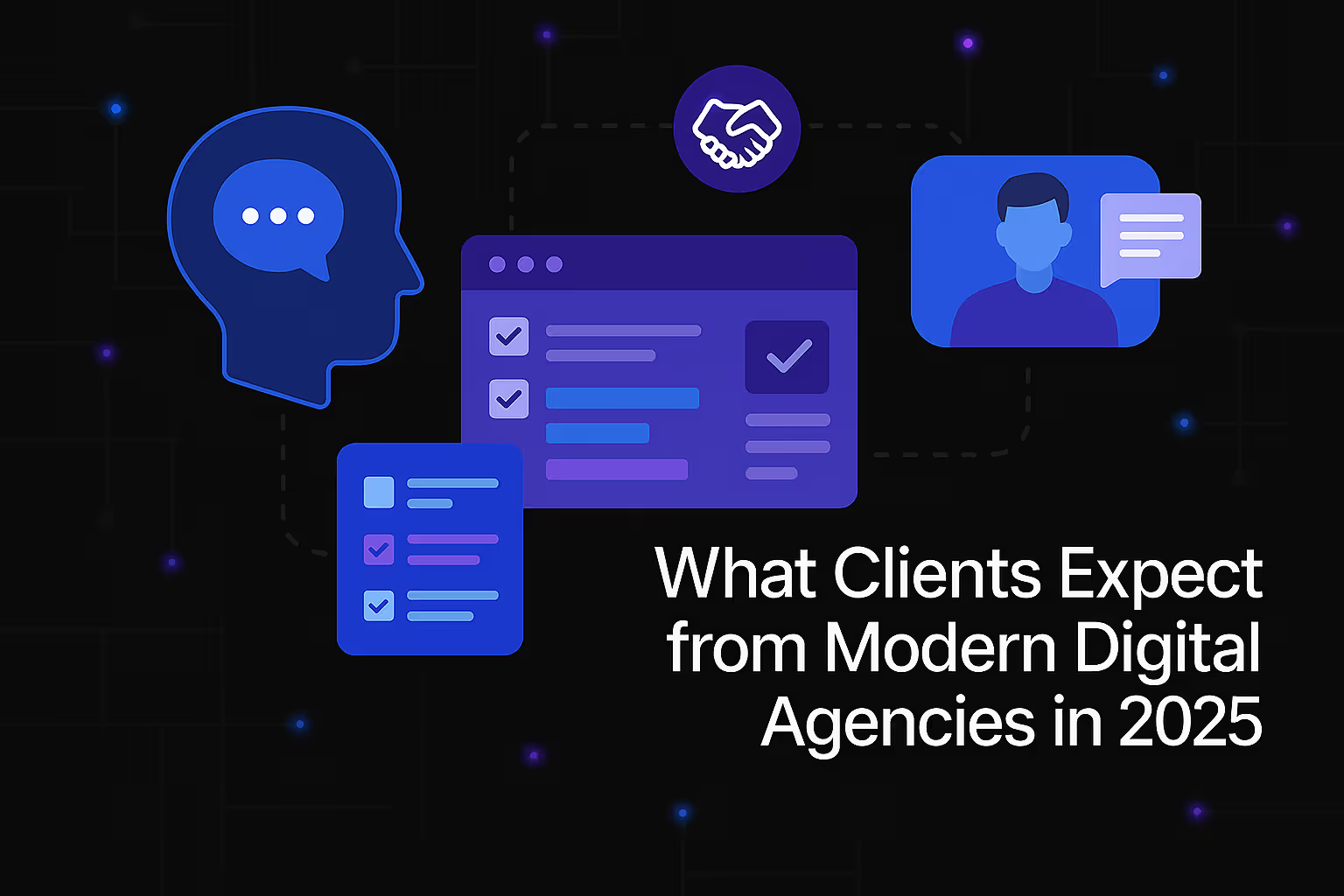What Clients Expect from Modern Digital Agencies in 2025

The digital landscape is a ceaselessly shifting terrain, a dynamic ecosystem where yesterday's groundbreaking innovation can quickly become tomorrow's baseline expectation. As we stride towards 2025, the relationship between businesses and their digital marketing agencies is undergoing a profound transformation. Clients are no longer merely seeking service providers; they are searching for strategic partners who can navigate this complexity, deliver measurable impact, and genuinely contribute to their overarching business objectives. The era of superficial metrics and isolated campaigns is fading, replaced by a demand for deep understanding, sophisticated execution, and undeniable return on investment.
This evolution is driven by several converging forces: the maturation of digital channels, the increasing sophistication of AI and data analytics, and a heightened awareness among business leaders about the true potential of online presence. Clients are becoming savvier, more informed, and consequently, their expectations are escalating. Agencies that fail to adapt to these new demands risk irrelevance, while those that embrace them will forge stronger, more prosperous, and truly collaborative relationships.
Beyond Vanity Metrics: The Demand for Tangible ROI
One of the most significant shifts in client expectations for 2025 is the relentless focus on demonstrable return on investment (ROI). The days of clients being content with high traffic numbers or increased social media followers without a clear connection to revenue or lead generation are largely over. Modern businesses need their digital marketing efforts to directly contribute to their bottom line, and they expect their agencies to prove it.
This translates into a demand for transparency and sophisticated reporting. Clients want to see a clear lineage from agency activities to business outcomes. This means moving beyond simple impression or click-through rates to comprehensive analyses that track conversions, customer acquisition costs, lifetime value, and overall revenue generated through digital channels. Agencies must be adept at integrating various data sources, from website analytics to CRM systems, to provide a holistic view of performance. The ability to present complex data in an easily digestible, actionable format will be paramount. Dashboards that offer real-time insights and allow for drill-down analysis will become standard, empowering clients to understand not just what happened, but why it happened and what comes next.
Furthermore, the expectation extends to strategic recommendations born from this data. Clients anticipate agencies will not just report on past performance but use those insights to continually refine strategies, identify new opportunities, and proactively address challenges. This involves a deep dive into campaign effectiveness, budget allocation, and the overall efficiency of digital spend. Agencies that can clearly articulate the financial impact of their work, demonstrating how their strategies translate directly into improved profitability or market share, will stand head and shoulders above the rest. The conversation is less about marketing activities and more about business growth facilitated by digital expertise.
Precision and Personalization Through Data
The pursuit of tangible ROI is inextricably linked to the ability to deliver highly precise and personalized marketing efforts. Generic, one-size-fits-all campaigns yield diminishing returns in an increasingly segmented and demanding market. Clients expect agencies to leverage data not just for reporting, but for deep audience segmentation, behavioral analysis, and the creation of hyper-targeted campaigns.
This involves advanced audience profiling, understanding not just demographic data but also psychographics, online behaviors, and specific pain points. Agencies will be expected to utilize sophisticated analytics tools to map customer journeys, identify key touchpoints, and optimize experiences at every stage. The goal is to move beyond broad targeting to pinpointing ideal customers with tailored messages that resonate deeply, driving higher engagement and conversion rates. This level of precision requires a strong foundation in data science, predictive analytics, and the ability to translate complex data sets into actionable marketing strategies. Clients expect their agencies to be data scientists as much as marketers, using insights to drive every decision.
The Nuances of Search: Beyond Traditional Keywords
Search engine optimization (SEO) remains a cornerstone of digital marketing, but its nature has evolved dramatically. Clients in 2025 expect agencies to grasp the intricate nuances of modern search, moving far beyond the simplistic keyword-stuffing tactics of the past. The focus has shifted towards understanding user intent, building authority, and leveraging advanced structural elements to communicate effectively with search engines.
Understanding User Intent as the Cornerstone
The most profound shift in SEO is the primacy of user intent. Clients now understand that simply ranking for a keyword is insufficient if that keyword doesn't align with what the user is truly trying to achieve. Agencies are expected to conduct sophisticated search intent analysis, dissecting why a user is performing a particular search and then crafting content and experiences that precisely address that underlying need. Is the user seeking information, looking to buy, comparing products, or navigating to a specific website? Each intent demands a different content approach and optimization strategy.
This deep understanding of user intent allows agencies to create content that is not just optimized for algorithms but is genuinely helpful, relevant, and engaging for human users. It's about answering questions comprehensively, solving problems effectively, and guiding users seamlessly through their journey. Clients expect agencies to be masters of empathetic content creation, ensuring every piece of digital real estate serves a clear purpose for the user.
The Ascendance of EEAT: Building Unquestionable Authority
Google's emphasis on Experience, Expertise, Authoritativeness, and Trustworthiness (EEAT) has fundamentally reshaped content strategy. Clients realize that simply publishing content is no longer enough; it must be backed by credible sources, demonstrable expertise, and a clear signal of authority. Agencies are now tasked with helping clients establish and amplify their EEAT across all digital touchpoints.
This involves more than just well-written blog posts. It encompasses showcasing the real-world experience of individuals within the organization, citing reputable sources, building strong backlinks from authoritative domains, and ensuring factual accuracy. Clients expect agencies to implement strategies that build genuine trust with both users and search engines. This could include developing comprehensive author bios, creating detailed case studies, securing industry mentions, and leveraging user-generated content to showcase real-world positive experiences. Agencies must become architects of digital reputation, meticulously building and nurturing the client's authority in their respective fields.
Semantic SEO and Structured Data: Communicating with Machines
The days of keyword matching being the sole focus are long gone. Search engines have become incredibly sophisticated, understanding the meaning and relationships between concepts, not just individual words. This is the realm of semantic SEO, and clients expect their agencies to be fluent in this advanced methodology. Semantic SEO involves understanding the broader topic around a keyword, covering related concepts, and building comprehensive content hubs that establish thematic authority.
Complementing semantic SEO is the expert application of structured data, also known as Schema Markup. Clients expect agencies to leverage this technical SEO element to explicitly tell search engines what their content is about. By tagging specific information – whether it's product details, reviews, events, or organization information – agencies can help content appear in rich snippets, knowledge panels, and other enhanced search results. This directly impacts visibility and click-through rates, making it a critical expectation for performance-driven clients. Agencies must possess the technical acumen to implement and maintain complex schema, ensuring it is accurate and up-to-date, thereby maximizing the client's presence in an increasingly visual and feature-rich search landscape.
The AI Imperative: Efficiency, Personalization, and Ethical Use
Artificial Intelligence (AI) is no longer a futuristic concept; it's a present-day reality profoundly impacting digital marketing. Clients in 2025 expect their agencies to not only embrace AI but to leverage it strategically and ethically to deliver superior results. The conversation has shifted from if AI will be used to how it will be integrated for maximum impact.
AI empowers agencies to achieve unprecedented levels of efficiency and personalization. From automating routine tasks like data analysis and report generation to powering sophisticated content creation and hyper-targeted ad campaigns, AI tools can significantly amplify human capabilities. Clients anticipate that agencies will use AI for faster keyword research, identifying emerging trends, optimizing bidding strategies in real-time, and even generating initial content drafts. This allows agencies to free up human talent for more strategic, creative, and relationship-focused endeavors. The ability to scale content production, analyze vast datasets instantaneously, and identify subtle patterns in consumer behavior becomes a core competency clients seek.
However, the "AI imperative" comes with a crucial caveat: the critical role of human oversight, creativity, and strategic direction. Clients are wary of purely AI-driven campaigns that lack a human touch, authenticity, or a deep understanding of brand voice and values. They expect agencies to act as the discerning intelligence behind the AI, guiding its output, refining its creations, and injecting the unique human elements that resonate with audiences. This includes ensuring AI-generated content aligns with brand guidelines, maintaining factual accuracy, and imbuing narratives with genuine emotion and perspective. The ethical use of AI is also paramount; clients expect agencies to be transparent about AI integration, adhere to privacy regulations, and ensure AI tools are used responsibly and without bias. The most successful agencies will be those that master the synergy between advanced AI capabilities and irreplaceable human insight, creating a powerful combination that delivers both scale and soul.
Proactive Adaptation and Continuous Optimization
The digital landscape is inherently volatile, with algorithms constantly evolving, consumer behaviors shifting, and new technologies emerging. Clients in 2025 will have zero tolerance for agencies that operate reactively. They expect their digital marketing partners to be agile, proactive, and committed to continuous optimization. This is a fundamental shift from project-based thinking to a continuous improvement mindset.
This expectation manifests in several ways. Firstly, agencies are expected to maintain a finger on the pulse of industry changes, particularly regarding search engine algorithm updates and new platform features. This includes investing in ongoing research, participating in industry dialogues, and implementing new best practices swiftly. Clients don't want to hear about changes after they've impacted performance; they want their agency to anticipate and prepare for them.
Secondly, continuous content auditing and performance analysis are no longer optional add-ons; they are a standard practice. Clients expect agencies to regularly review existing content for relevance, accuracy, and performance. This involves identifying underperforming content for optimization, refreshing outdated information, or even strategically deprecating content that no longer serves a purpose. The ability to measure and track SEO success using a comprehensive set of metrics is vital, allowing for agile adjustments and iterative improvements.
Finally, clients anticipate agencies will adopt a first-mover advantage mindset. This involves identifying emerging trends, niche opportunities, and long-tail keywords before they become highly competitive. By proactively monitoring social media discussions, analyzing evolving search query patterns, and spotting nascent market shifts, agencies can position their clients to capture early rankings and establish dominance in new areas. This foresight and adaptability are key differentiators for agencies aiming for top-tier performance.
The Partnership Paradigm: Trust, Transparency, and Innovation
At the heart of all these evolving expectations lies a fundamental redefinition of the client-agency relationship. In 2025, clients are not simply procuring a service; they are investing in a strategic partnership built on mutual trust, radical transparency, and a shared commitment to innovation.
The relationship transcends the transactional. Clients expect agencies to become an extension of their own team, deeply understanding their business objectives, market challenges, and long-term vision. This requires open and honest communication, regular strategic discussions, and a willingness to collaboratively problem-solve. Transparency about processes, challenges, and successes is paramount, fostering an environment where both parties are aligned and working towards common goals. Clients want to feel informed and empowered, not just handed a report.
Innovation is also a non-negotiable expectation. The digital world doesn't stand still, and clients expect their agencies to be at the forefront of new technologies, methodologies, and creative approaches. This means agencies should constantly be experimenting, learning, and bringing fresh ideas to the table. Whether it's exploring new platforms, pioneering personalized customer experiences, or leveraging cutting-edge analytics, clients rely on their agencies to keep them ahead of the curve. This isn't about chasing every shiny new object, but about strategically adopting innovations that genuinely drive results and provide a competitive edge. The expectation is for agencies to be not just implementers, but thought leaders and strategists who proactively seek out and apply advancements that will benefit their clients' businesses.
Conclusion: The Modern Digital Agency as a Growth Catalyst
As we look to 2025, the role of modern digital agencies has evolved from mere marketers to indispensable growth catalysts. Clients expect a sophisticated blend of technological prowess, data-driven strategy, unparalleled human insight, and unwavering commitment to tangible business outcomes. The agencies that thrive will be those that embrace these elevated expectations, transforming their operations to deliver not just campaigns, but genuine partnerships built on trust, transparency, and continuous innovation.
The future demands agencies that are deeply empathetic to user needs, meticulous in their pursuit of authority and trustworthiness, and adept at leveraging AI as a powerful force multiplier for efficiency and personalization. They must be agile navigators of a dynamic digital landscape, continuously optimizing and proactively adapting to change. Ultimately, clients in 2025 seek more than just digital services; they seek a strategic ally capable of unlocking their full online potential and driving sustainable business growth in an increasingly competitive world. The agencies that successfully embody this multifaceted role will not only meet but exceed client expectations, solidifying their position as invaluable partners in the digital age.
Similar Insights
Stay Updated with Our Insights
Join our newsletter for the latest trends and tips in web development and digital marketing.

